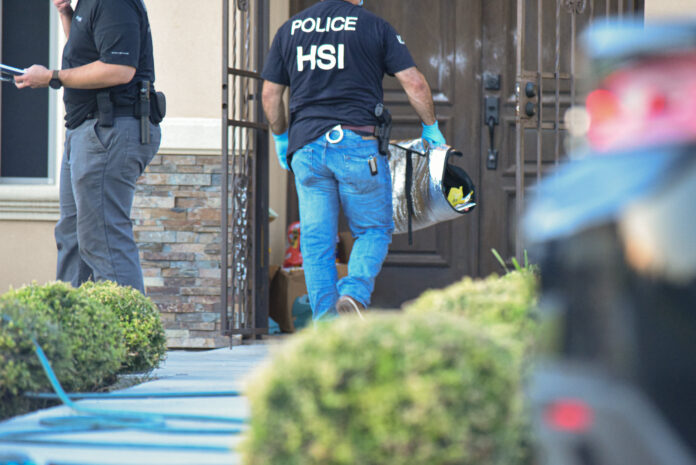Wiretaps and cooperating defendants indicate some of the suspects arrested last week in Starr County as part of a drug conspiracy case revealed an alleged shift in binational cartel power structure, planned retaliation on a suspected “snitch,” and raised questions about the financing of a judicial campaign, a government attorney said during court hearings Monday.
About half of those arrested by federal agents last week, including the alleged drug trafficking leader and a justice of the peace accused of helping him, were arraigned.
Ignacio “Nacho” Garza, Roel Valadez, Diego Alberto Reyes Roiz, Jose Ortiz, and Isidoro “Lolo” Garza Garza went before U.S. Magistrate Judge J. Scott Hacker on Monday. Another defendant, Abel Reyes, was arraigned Friday.
Each told the judge they were not guilty of the charges against them.
A 10-count indictment alleges the defendants were involved in a drug conspiracy that moved narcotics — marijuana, cocaine and methamphetamine — on eight different occasions starting from July 2020 through August.
Assistant U.S. Attorney Patricia Profit said the government was opposed to the release of Ignacio “Nacho” Garza who they consider to be a danger to the community and a flight risk.
WIRETAPS AND MEETINGS WITH MEXICAN DRUG BOSS
Profit said Garza was charged with the drug seizures as a result of using Title III intercepts, or wiretaps, but the government attorney also said two cooperating defendants identified Igacio “Nacho” Garza’s role in the methamphetamine seizure.
During the time the government was listening in to Garza’s calls, Profit said they reportedly heard Garza planning to hire a Mexican hitman to kill a man identified by Profit as “Ranchero.” Garza grew suspicious of Ranchero, who helped load drugs out of Rio Grande City, and falsely suspected he was cooperating with law enforcement, Profit said.
The threats were made in February, a date the defense would point out, when Garza claimed Ranchero “snitched” and that he was waiting on someone to be sent to him.
On a different call made Feb. 9, Garza, referring to Ranchero, allegedly said, “I don’t know why. I don’t know why. They need to take that guy away, dude. They need to f—– take him away. That guy knows too much.”
Carlos A. Garcia, Garza’s attorney, rebutted, and stated, “If it was so concerning to the government, why didn’t they swoop down and make an arrest?” He added, “If he was such a danger, why didn’t they take him off the street?”
Profit clarified an FBI agent reached out to Garza at the time he was considering retaliation. The agent also discussed “something else,” but sent a message that the FBI was interested in talking to him.
The government said Garza provided a confession after his arrest in which he said he met with the plaza boss of Camargo, a high-ranking member of the cartel in Mexico.
Garza also reportedly said he financed the campaign of Precinct 4 Justice of the Peace Roel “Role” Valadez to have influence in the Starr County judicial system. Valadez told investigators Garza supported his campaign by buying chicken plates, Profit later added.
Prior to the confession, Garcia said a doctor had just injected Garza with medication.
Garcia advocated for the release of his client, who is a U.S. citizen and lifelong resident of Rio Grande City, on a reasonable bond. Garcia said Garza has had a construction business for the last seven years, has no criminal conviction, and expanded on his financial generosity with members of the community affected by flooding or medical ailments.
Twenty-six community members also provided letters vouching for Garza.
The judge said he will consider the long ties to the community before making a final decision on the bond.
ROEL VALADEZ’S FAMILY TIES QUESTIONED
Family ties and community participation are considered during bond determinations, but they were problematic factors for Valadez, whose family, the prosecutor said, is suspected of being involved in moving drugs into the country.
Profit said Valadez’s father and father-in-law are suspected of moving pain killers into the U.S.
Wiretaps also identified Valadez negotiating a “substantial amount of marijuana” to be taken to Houston, and negotiating and selling smaller quantities of marijuana.
As a justice of the peace, Profit said he abused his official position by helping narcotic traffickers, namely Garza, by informing them of where companions were in the judicial system, helping them to get out on bond, and identifying vehicles driven by law enforcement.
Valadez’s attorney, David Flores, asked the judge to consider his client’s clean criminal record, no family ties in Mexico, and family life when determining bond.
Profit said the government is unopposed to the release but pointed out the proposed $100,000 bond with a $5,000 cash deposit is not “that extensive” but does not put up properties. It would require a family member to sign as co-surety, but Profit said the government suspects some of his family of wrongdoing.
Hacker asked Profit if Valadez will continue serving as a justice of the peace after his release.
Profit said they did not know but said, “clearly, the government does not believe that he should go forward with his role as a justice of the peace.”
Flores told the judge these are only allegations which they intend to “fiercely challenge.”
Valadez was remanded to federal custody while his bond is being considered.
REYES ROIZ POISED TO TAKE OVER MEXICAN PLAZA
One of the defendants was poised to take over as a leader in the Gulf Cartel, the prosecutor disclosed during the detention hearing for Diego Alberto Reyes Roiz, 40.
Reyes Roiz, a permanent resident alien, is facing seven counts of the 10-count indictment; the only other defendant facing more counts is Ignacio “Nacho” Garza, who is considered the leader of the drug trafficking organization.
He is suspected of being “heavily involved” in coordinating the trafficking of narcotics from Mexico into the United States. Profit said Reyes Roiz indicated he had a close relationship with “Cocho” Sanchez, head of the drug cartel in Camargo, according to a Mexican source familiar with the situation.
According to cooperating defendants, Reyes Roiz was in line to take over a position in Mexico as one of the decision makers of the Gulf Cartel.
His attorney, Jose Pepe Garza, said GPS monitoring could resolve any concerns of fleeing into Mexico. However, the government said Reyes Roiz’s wife crossed into Mexico over 250 times in the last two years, including the most recent visit on Sept. 15.
Bond was only determined for Abel Reyes, who was arraigned on Friday. Hacker set bond at $75,000, along with a $5,000 cash deposit which was received Monday. The others are yet to be determined.
Eight other defendants who were arrested last week are scheduled to be arraigned Tuesday.
EDITOR’S NOTE: A change was made to correct the name of a person involved in the case.





